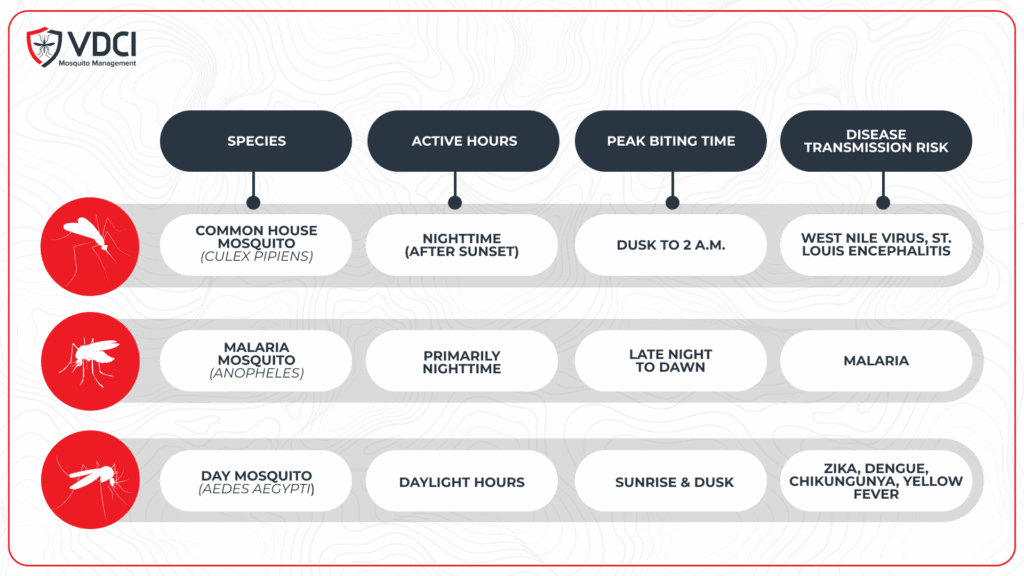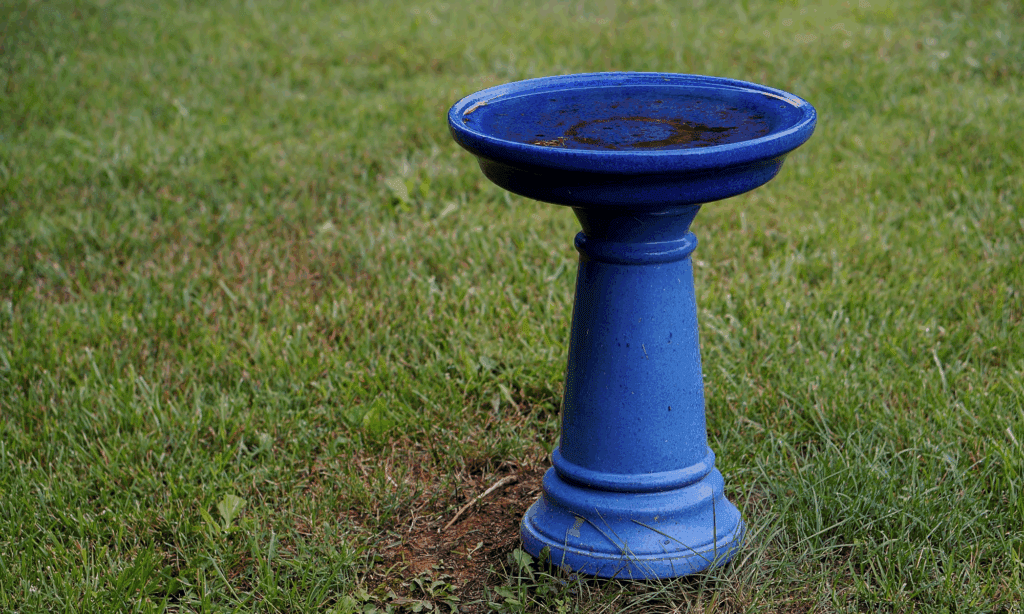When Do Mosquitoes Go Away at Night? What Time They Stop Biting and How to Stay Protected
Mosquitoes are more than annoying buzzes and bites. They can disturb your peace and pose a serious health risk, carrying diseases like West Nile virus, dengue, and Eastern Equine Encephalitis (EEE).
You’re not alone if you’ve wondered– “Do mosquitoes go away at night?” And when to enjoy the outdoors bite-free. And those are great questions to ask! Their feeding activity isn’t random. It follows specific patterns that vary by species, time of day, and even environmental conditions.
Understanding their feeding patterns can make all the difference in protecting yourself and your loved ones. Read on to uncover the “when” and “how” of avoiding these pesky pests.
VDCI (Vector Disease Control International) is committed to providing the knowledge and tools needed to help protect your local community. By understanding mosquito behavior and implementing proactive management strategies like VDCI’s Integrated Mosquito Management (IMM) programs, you can reduce risks and create safer, more enjoyable outdoor spaces.
When Do Mosquitoes Go Away at Night?
Most mosquitoes become less active or stop biting by 2–4 a.m., winding down after a busy feeding period at dusk and early night. This timeline depends on their species.
Common nighttime mosquitoes, like the house mosquito (Culex pipiens), can stay active until sunrise, while mosquitoes such as the yellow fever mosquito (Aedes aegypti), which prefer the daytime, stop biting once it gets dark.
By identifying which mosquito species are active in your area, you can take steps to reduce bites and prevent diseases.
Why Timing Matters

Mosquitoes are key vectors for serious diseases. Understanding their feeding habits and peak biting times can help you:
- Minimize exposure for yourself, your family, or your community.
- Disrupt reproduction and breeding cycles by aligning prevention efforts with mosquito behavior.
Incorporating timing into an Integrated Mosquito Management (IMM) program can improve effectiveness and reduce unnecessary pesticide use, which is a win for everyone.
Types of Mosquito Activity
Different mosquito species exhibit distinct daily patterns of activity, which can be broadly categorized:
Crepuscular (active at dusk and dawn): Many mosquito species, including Anopheles mosquitoes (malaria vectors) and Culex mosquitoes (house mosquitoes), feed actively during sunrise and sunset.
Nocturnal (active at night): These species become busy after dark, peaking later into the evening or early morning hours.
Diurnal (active during the day): Mosquitoes like the yellow fever mosquito (Aedes aegypti) and the Asian tiger mosquito (Aedes albopictus) are most active when the sun is up, with heightened activity in the early morning and late afternoon.
Common Mosquito Species and Their Feeding Habits
Here’s an overview of well-known mosquito species and when they’re most likely to bite

Understanding which mosquito species are active in your area is a key first step in building an effective prevention plan.
When Do Mosquitoes Stop Biting at Night?
For many nocturnal mosquito species, biting activity drops sharply between 2 and 4 a.m. and typically stops by sunrise. As daylight increases, mosquitoes seek out cool, humid hiding spots—like tall grass, dense bushes, or damp, shaded corners—to rest and conserve energy until dusk returns.
Do Mosquitoes Sleep?
Mosquitoes don’t sleep like humans. Their rest periods coincide with their least active times. For nocturnal mosquitoes, this means conserving energy during the day by remaining hidden in cool, dark spaces.
Practical Tips for Preventing Mosquito Bites at Night
- Use EPA-Approved Repellents: Choose repellents containing 10% – 30% DEET or picaridin for long-lasting protection.
- Wear Protective Clothing: Cover exposed skin with light-colored long-sleeve shirts, pants, and socks, especially during peak mosquito activity times.
- Use Mosquito Nets: Protect sleeping areas indoors or outdoors with fine mesh nets to prevent night bites.

Property Management
- Remove Sources of Standing Water: Mosquitoes lay eggs in stagnant water. Regularly empty birdbaths, flowerpots, gutters, and other potential breeding sites.
- Install Screens: Fit windows and doors with fine mesh screens to keep mosquitoes outside.
- Utilize Fans: A simple fan on your deck or patio can effectively deter mosquitoes as they struggle to fly against the air current.

Frequently Asked Questions
Q: Do mosquitoes bite indoors at night?
A: Yes, mosquitoes can enter homes and bite if windows or doors are unscreened. Keep entry points tightly sealed and use mesh screens to reduce indoor exposure.
Q: Are mosquitoes active after midnight?
A: Many nocturnal species remain active well after midnight, often feeding until dawn. Activity usually slows between 2–4 a.m., but doesn’t stop completely until sunrise.
Q: Can natural scents repel mosquitoes?
A: Scents like citronella, lavender, and peppermint may offer limited deterrence. For best protection, use EPA-registered repellents and wear protective clothing, especially during dusk and dawn, when mosquitoes are most active.
Final Thoughts
Mosquitoes aren’t just a summertime nuisance—they’re a menace to public health. Recognizing their activity patterns and tailoring prevention efforts accordingly is essential for reducing their impact. At VDCI, we deliver proactive, science-backed mosquito management programs that prioritize both effectiveness and environmental responsibility.
Through a comprehensive approach—including public education and targeted, expert-driven prevention methods—we help communities reclaim and enjoy outdoor spaces.
Key Takeaways:
Mosquito species follow unique schedules. Some bite during the day (e.g., yellow fever mosquito Aedes aegypti), while others continue throughout the night (e.g., house mosquito Culex pipiens).
Mosquito activity declines between 2 and 4 a.m., with complete rest occurring by sunrise.
Protection methods include repellents, protective clothing, removal of standing water, and proper screening.
Staying informed about local mosquito behaviors supports effective, proactive prevention.
Partner with VDCI for expert, sustainable mosquito management solutions tailored to your community’s needs. Together, we can create safer, healthier outdoor spaces for everyone. Contact us today to learn more about our Integrated Mosquito Management programs.
Want to learn more about mosquitoes and their life cycles?
Contact Our Experts
Complete the form below or call us at 800-413-4445 to speak to an expert about your mosquito management needs.
 Since 1992, Vector Disease Control International (VDCI) has taken pride in providing municipalities, mosquito abatement districts, industrial sites, planned communities, homeowners associations, and golf courses with the tools they need to run effective mosquito control programs. We are determined to protect the public health of the communities in which we operate. Our mosquito control professionals have over 100 years of combined experience in the field of public health, specifically vector disease control. We strive to provide the most effective and scientifically sound mosquito surveillance and control programs possible based on an Integrated Mosquito Management approach recommended by the American Mosquito Control Association (AMCA) and Centers for Disease Control and Prevention (CDC). VDCI is the only company in the country that can manage all aspects of an integrated mosquito management program, from surveillance to disease testing to aerial application in emergency situations.
Since 1992, Vector Disease Control International (VDCI) has taken pride in providing municipalities, mosquito abatement districts, industrial sites, planned communities, homeowners associations, and golf courses with the tools they need to run effective mosquito control programs. We are determined to protect the public health of the communities in which we operate. Our mosquito control professionals have over 100 years of combined experience in the field of public health, specifically vector disease control. We strive to provide the most effective and scientifically sound mosquito surveillance and control programs possible based on an Integrated Mosquito Management approach recommended by the American Mosquito Control Association (AMCA) and Centers for Disease Control and Prevention (CDC). VDCI is the only company in the country that can manage all aspects of an integrated mosquito management program, from surveillance to disease testing to aerial application in emergency situations.

